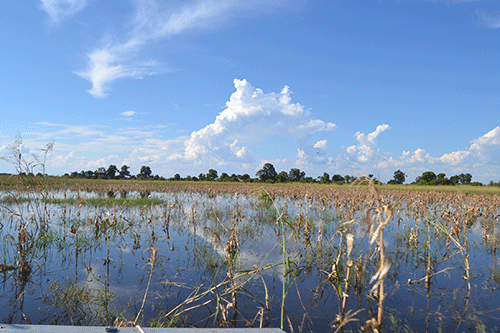n Albertina Nakale
KATIMA MULILO – The law-enforcement authorities in the Zambezi region have expressed great concern about the high incidences of maize meal smuggling into the region from neigbouring Zambia.
Since 2004, Zambia has consistently cultivated more maize – the national staple food – than is consumed domestically. The Zambian government buys the majority of maize directly from farmers
In Zambia, a bag of maize meal costs about 70 Kwacha (about N$71), and when smuggled into Namibia, traders apparently triple the price to between N$250 to N$350 for a 25kg bag.
Sadly, such food items are smuggled via unauthorised routes daily.
“We experience maize grains and maize meal smuggling into Namibia on a daily basis,” Zambezi police spokesperson Kisco Sitali revealed in an interview with New Era.
Some residents in Zambezi admitted in confidence that they are buying smuggled food items such as maize meal from Zambia that is brought in via non-designated border points because it is cheaper than locally-produced maize.
“We have families to feed. We did not get a good harvest, so the smuggled bags of maize meal and grains is cheaper for us, compared to buying in the shops here. We can get a 25 kg bag of maize meal for N$250 from Zambia. Beans and other food items are also cheaper from Zambia,” said a man who preferred anonymity.
Some even cited the poor harvest in some parts of the region, where regional councillors call for government’s intervention to resume drought relief food distribution to assist needy communities.
The current skyrocketing food and fuel prices experienced globally have also worsened the situation.
Sitali confirmed that food items such as sweet potatoes and a variety of beans are likewise smuggled in daily. However, he rubbished allegations that maize meal and grains are smuggled into Namibia due to poor harvests, saying it has been a daily occurrence even during the days of good harvests.
He, therefore, warned those involved not to use poor harvests and other reasons as an excuse to buy and bring smuggled food items into the country.
On the streets of Katima Mulilo and nearby villages, one can get a bag of more than 10 sweet potatoes for N$10.
Sitali said the police are doing everything they can to curb the situation, and when they find the illegally-imported items, they record them and dispose of them.
“It is something of a concern to us. We have seen farmers producing maize meal with a good harvest, but not selling their products because the market is flooded with smuggled goods. They go and register at the millers, and leave local farmers without a market. We discourage people from buying smuggled maize meals and grains,” Sitali continued.
According to the Food and Agriculture Organisation of the United Nations (FAO), cereal imports into Namibia are expected to decline in 2022/23.
The country is a net importer of cereals, with imports accounting on average for about two-thirds of the national cereal consumption requirement.
However, FAO stated that the large domestic cereal outturns in 2021 and 2022 have lessened the import needs in the 2022/23 marketing year (May/April). Consequently, imports (mostly maize and wheat for food and feed) are estimated at 241 000 tonnes, about 17% less than the five-year average.
“Import requirements of maize, mostly sourced from South Africa, are forecast at 12 000 tonnes, a fourth lower than the five-year average. Import requirements of wheat are forecast at about 110 000 tonnes, slightly above the average level. In the previous three marketing years, more than 50% of the wheat imports originated in the Russian Federation,” FAO added.
– anakale@nepc.com.na


